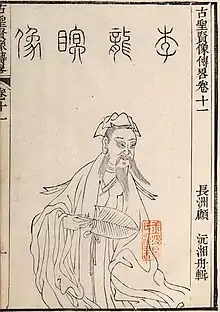Li Gonglin
Li Gonglin (李公麟, 1049–1106), style name Boshi (伯時), art name Longmian Jushi (龍眠居士, Householder of Sleeping Dragon), was a Chinese antiquarian, painter, and politician during the Northern Song Dynasty.

Li Gonglin

A painting of court ladies on horseback, a 12th-century remake by Li Gonglin after an 8th-century original by Zhang Xuan.
Wikimedia Commons has media related to Li Gonglin.
Born into a scholarly home near what is modern day Lu'an City, Li Gonglin passed the highest level of civil service examinations at 21 and became a civil officer. He became famous for his paintings of horses, then he turned to Buddhism and Taoism religious painting, as well as portrait and landscape painting. His painting style was attributed to the style of Gu Kaizhi and Wu Daozi. He made antiquarian contributions in the areas of copperware and Jade Seal dated between the Xia Dynasty and the Zhou Dynasty.[1]
References
- Harrist, Robert E. (1995). "The Artist as Antiquarian: Li Gonglin and His Study of Early Chinese Art". Artibus Asiae. 55 (3/4): 237–280. doi:10.2307/3249751. JSTOR 3249751.
Further reading
- Barnhart, Richard (1993). Li Kung-lin's Classic of filial piety. New York: The Metropolitan Museum of Art. ISBN 0870996797.
External links
- Li Gonglin and his painting gallery at China Online Museum
- Three handscrolls by Li Gonglin in the collection of the Metropolitan Museum, New York
This article is issued from Wikipedia. The text is licensed under Creative Commons - Attribution - Sharealike. Additional terms may apply for the media files.
